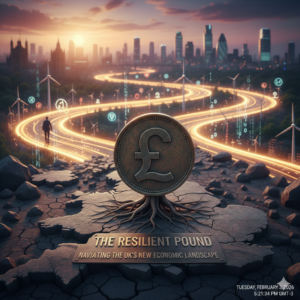
Master Your Money and Create a Secure Financial Future
There are few things that have as much of an impact on your overall financial health as building and sticking to a budget. Especially in today’s rapidly changing UK economy. Whether you’re working toward a house deposit, juggling credit card debt or just trying to rein in your spending, this is what you need to do now to create a realistic and sturdy budget for 2025.

🧾 Step 1: Know Your Net Income
Begin by calculating your monthly net income — that which you take home after taxes, National Insurance and pension contributions. List all reliable streams of income:
- Salary (after deductions)
- Freelance or side job income
- State help (Universal Credit, Child Benefit)
- Rent or Passive Earnings
🔍 Pro tip: If your income varies widely, try averaging the last 3–6 months to get an estimate.
💸 Step 2: Keep Detailed Track of Your Expenses
You need to know the lay of your financial land before you can try to stanch the outflow. Look back at the last 2–3 months of:
- Bank statements
- Credit card transactions
- Direct debits (Net flix, gym, insurance etc)
Categorise expenses into:
- The basics: Rent/mortgage, utilities, food, transportation
- Budget: Credit card debits, loans, savings
- Lifestyle: Eating, entertainment, subscriptions
💡 You can make this easier using budgeting apps such as Emma or Moneyhub (both UK-only).
🧮 Step 3: Decide on a Budgeting Method
Choose a budgeting approach that works for you:
50/30/20 Rule:
- 50% on essentials
- 30% on discretionary spending
- 20% on savings or paying off debt
Zero-Based Budget:
Nothing gets left on the table, so you subtract your income from your expenses and end up with zero, much to the delight of the detailed-oriented planners among us.
📉 Step 4: Look for Opportunities to Scale Back
Once you know what you’re spending money on, it’s easier to find ways to trim it. Common tips:
- Go with a cheaper utility provider (use UK comparisons sites like Uswitch)
- Cancel unused subscriptions
- Cap contactless card spending via mobile banking apps You can place a cap on how much your child can spend using their contactless card.
💷 Even knocking £50–£100 a month off can make a big difference to the amount that’s saved over time.
💳 Step 5: Establish Financial Goals Since the best way to feel more confident about your finances is to have money saved, you both should be working on financial goals.
Budgeting becomes simpler when you know what it’s for. Set both short and long term goals:
- Short term: Clear a credit card, save up £1,000 in an emergency fund
- Longer term: Save for a deposit, invest through a Stocks & Shares ISA
Set SMART goals that are, Specific, Measurable, Achievable, Relevant and Time-bound.
📊 Step 6: Quarterly Review & Adjust If every month covers its costs and then some, you can leave your budget the way that it is and just review and adjust going through these steps every 3-6 months.
Life happens — so should your budget. Book in a monthly ‘money check in’ to see how you’re tracking and adjust for the things:
- Unexpected expenses
- Income changes
- New financial goals
Consistency is key. The more you adhere to this plan, the more frequent and confidence-boosting your financial clarity will be.
✅ Final Thoughts: Get in Control of Your Finances in 2025
Creating a personal budget is one of the more intimidating tasks, though — and it’s also one of the most powerful steps you can take to get a handle on your finances and minimize money-related stress. In the UK, where the cost of living keeps changing and economic shifts have direct implications for your own wallet, it is more important than ever to have a clear financial plan.
By knowing exactly how much money is coming in and where it’s going out, you can make smarter decisions about your spending, saving and borrowing. You might find a full-time salary, income from freelancing or government support making its way into your account, but having a budget means you can put your money toward your real life priorities – whether that’s saving toward a mortgage, paying off credit card debt or putting some money aside for a rainy day.
A well-crafted budget also serves as a cushion against the winds of uncertainty. And if something unexpected comes up — car repairs or a surprise bill — you’ll be in a much better position to handle it without turning to high-interest credit. And what’s more, regular budgeting fosters good habits like setting money aside for a rainy day, monitoring day-to-day spending habits and thinking about long-term goals such as retirement or investing in an ISA.
Even small shifts — such as canceling unused subscriptions or enrolling in automatic savings — can add up over time. The trick is to remain consistent with your new plan, review it every month, and make adjustments as your life changes.
Remember: you’re not depriving yourself of anything! Budgeting is about freedom, not restriction. It enables you to spend with purpose, eliminate debt, and practice security both now and into the future. In 2025 and beyond, your ability to confidently take care of your money may become one of your best financial assets.
Start today. You are looking out for your future self here.
Our Post


The Resilient Pound: Navigating the UK’s New Economic Landscape


